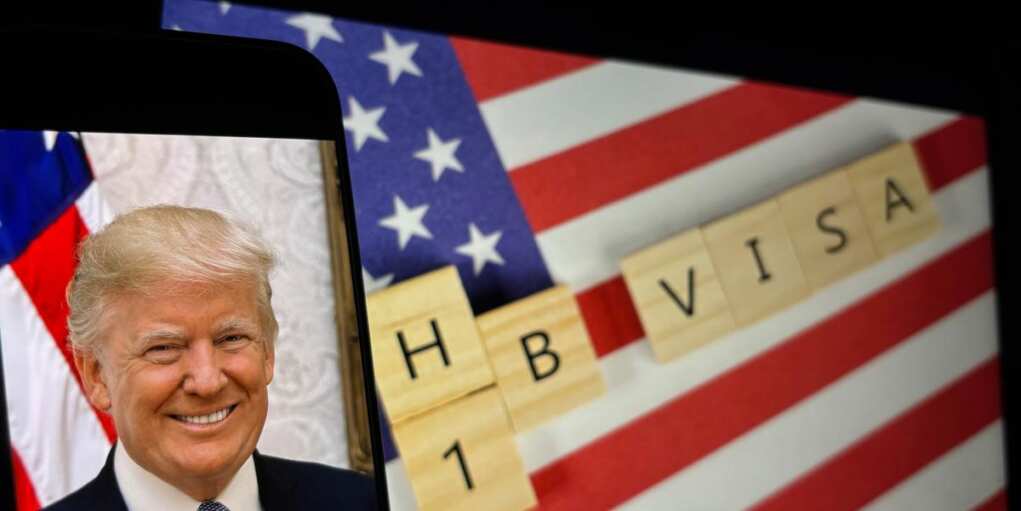Trump Accepts H1B’s As “Necessary” — The Reason Why Is Weird

During an interview on Fox News, President Donald Trump spoke about the controversial H-1B visa program, admitting that bringing in large numbers of foreign workers can hurt American wages — but said some positions still require outside talent.
Ingraham pressed him directly on whether his administration would prioritize limiting the use of these visas, which are often used by tech and manufacturing companies to hire foreign workers instead of Americans.
She asked, “The H-1B visa thing will not be a big priority for your administration? Because if you want to raise wages for American workers, you can’t flood the country with tens of thousands or hundreds of thousands of foreign workers.”
Trump responded, “I agree, but you also do have to bring talent.”
Ingraham quickly pushed back.
“Well, we have plenty of talented people here,” she said.
Trump didn’t hesitate.
“No, you don’t,” he answered.
Ingraham followed up again, sounding surprised. “We don’t have talented people here?”
Trump doubled down.
“No, you don’t have certain talents, and people have to learn. You can’t take people off like an unemployment line and say, I’m going to put you into a factory where we’re going to make missiles.”
He gave a specific example to explain his reasoning, referring to an incident in Georgia.
“I’ll give you an example: In Georgia, they raided because they wanted illegal immigrants out. They had people from South Korea that made batteries all their lives. Making batteries [is] very complicated. It’s not an easy thing, and very dangerous, a lot of explosions, a lot of problems,” Trump said.
He continued, “They had like 500 or 600 people, early stages, to make batteries and to teach people how to do it. Well, they wanted them to get out of the country. You’re going to need that, Laura. I know you and I disagree on this. You can’t just say, a country is coming in, going to invest $10 billion to build a plant, and you’re going to take people off an unemployment line who haven’t worked in five years and they’re going to start making their missiles. It doesn’t work that way.”
Trump’s comments highlighted a practical side of the H-1B debate that rarely gets attention — the struggle for certain industries to find specialized workers who can fill highly technical jobs, even while many Americans remain unemployed.
The H-1B visa system allows U.S. companies to hire foreign professionals in fields such as technology, science, and manufacturing when employers claim they cannot find qualified American workers. Critics say the program has been abused for years, with major corporations using it to replace U.S. employees with cheaper labor from overseas.
Trump’s remarks appeared to strike a middle ground between protecting American jobs and recognizing that some industries depend on foreign talent to operate. His tone suggested he understands the balance between economic protection and industrial competitiveness — even if it means an unpopular position among some of his base.
The president’s comments came as his administration works to rebuild manufacturing capacity and bring high-tech jobs back to the United States. New factories and production plants across the country, from semiconductors to electric vehicle batteries, have highlighted the ongoing need for technical expertise that takes years to develop.
But Trump also made clear that his stance doesn’t mean open borders or mass visa programs. His focus remains on American prosperity and ensuring foreign workers fill roles only when absolutely necessary — not to drive down wages or replace U.S. labor.
His exchange with Ingraham underscored the tension between economic nationalism and global business demands. It showed how, even as he pushes for American jobs and higher wages, Trump remains committed to rebuilding industries that have long relied on specialized skill sets — whether they come from within the country or, when needed, from abroad.
As the conversation wrapped, Ingraham noted that many Americans feel displaced by foreign labor. Trump acknowledged that frustration but maintained that the U.S. must also be realistic about its workforce needs.
In his words, “You’re going to need that, Laura.”
